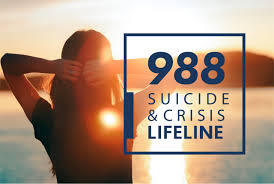The importance of 988 cannot be overstated
![]()

This editorial is the opinion of Morgan Hill Life
In an era where mental health challenges are increasingly recognized as a public health crisis, Santa Clara County’s push to promote its 988 Crisis and Suicide Prevention Lifeline is not just commendable — it’s essential. Two years after its national rollout, the 988 service remains underused, a troubling reality that underscores a critical gap in our approach to mental health care.
 The 988 lifeline represents a paradigm shift in crisis response, offering a dedicated channel for mental health emergencies that’s as easy to remember as 911. Yet, as Santa Clara County’s new awareness campaign reveals, many residents remain unaware of this vital resource. This knowledge gap is not unique to one county. It’s a national challenge that demands our immediate attention.
The 988 lifeline represents a paradigm shift in crisis response, offering a dedicated channel for mental health emergencies that’s as easy to remember as 911. Yet, as Santa Clara County’s new awareness campaign reveals, many residents remain unaware of this vital resource. This knowledge gap is not unique to one county. It’s a national challenge that demands our immediate attention.
The importance of 988 cannot be overstated. In a country where suicide rates have been climbing and where the opioid epidemic continues to ravage communities, having a readily accessible, 24/7 lifeline staffed by trained professionals can mean the difference between life and death. The service’s expansion to include text and chat options is a crucial step in meeting people where they are, particularly younger generations who may be more comfortable with these modes of communication.
But a service is only as good as how well it is used. Santa Clara County’s multi-pronged approach to raising awareness — through social media, traditional advertising, and community partnerships — should serve as a model for other jurisdictions. The county’s new slogan, “988 – Hope has a new number,” succinctly captures the essence of what this service represents: a beacon of hope in times of darkness.
 Particularly noteworthy is the county’s emphasis on the lifeline’s ability to dispatch mobile crisis teams when necessary. This feature addresses a long-standing critique of mental health crisis response — that it too often involves law enforcement, which can escalate rather than de-escalate situations. By offering non-police responses in appropriate circumstances, 988 represents a more nuanced and potentially more effective approach to crisis intervention.
Particularly noteworthy is the county’s emphasis on the lifeline’s ability to dispatch mobile crisis teams when necessary. This feature addresses a long-standing critique of mental health crisis response — that it too often involves law enforcement, which can escalate rather than de-escalate situations. By offering non-police responses in appropriate circumstances, 988 represents a more nuanced and potentially more effective approach to crisis intervention.
However, as we applaud these efforts, we must also acknowledge that a phone number alone is not a panacea for our mental health challenges. It must be part of a broader, well-funded mental health infrastructure that includes preventive care, ongoing treatment options, and efforts to address the social determinants of mental health.
Moreover, as we promote 988, we must ensure the system can handle increased call volumes. Reports that Santa Clara County’s call center is fully staffed and ready for more calls are encouraging, but this capacity must be maintained and expanded nationwide as awareness grows.
The 988 lifeline represents a critical step forward in how we approach mental health crises. But its success depends on our collective efforts to spread the word and ensure that when people reach out for help, a robust system is there to catch them.
Santa Clara County’s campaign is a step in the right direction. Now, it’s incumbent upon all of us — policymakers, healthcare providers, educators, media and community leaders — to amplify this message: Hope has a new number, and it’s 988.
How it works
- The 988 service is free, anonymous, and confidential, unless law enforcement or medical emergency response is needed. If law enforcement or medical services are needed, the counselor will ask for contact information so responders can help.
- 988 can be accessed via text message, or chat at 988lifeline.org/chat.
- 988 is staffed 24 hours a day, seven days a week, by trained counselors. They will work with you to understand what you need and support you. Support can be given on the phone or in person if needed.
- Language interpretation is available in more than 200 languages, including Spanish, Vietnamese, Chinese, and Tagalog. Texting is only in English and Spanish.
- In-person response is available if needed from the county’s unique mobile crisis teams, made up of crisis clinicians and peer outreach specialists to help callers. Services that both involve or do not involve law enforcement are available. That includes:
— The Trusted Response Urgent Support Team (TRUST) which involves response from crisis intervention specialists without law enforcement involvement.
— Mobile Response and Stabilization Services (MRSS) for children and young adults ages 4 to 20.
— The Mobile Crisis Response Team (MCRT) for adults includes master’s level clinicians who may partner with law enforcement based on the criticality of the situation.
- Calls to 988 are routed by area code. If the phone used does not have a 408, 650, or 669 area code, the county’s service can be accessed by calling 1-800-704-0900 and pressing 1.
(Source: County Office of Communications and Public Affairs)






